HIS 277A: Political, Religious Impact of Mongols in Middle East
VerifiedAdded on 2023/05/28
|6
|1330
|353
Essay
AI Summary
This essay explores the transformative impact of the Ilkhanid age, a period marked by Mongol dominion over the Middle East, on the region's political, cultural, and economic landscape. It analyzes how the Mongol invasions led to significant changes, including the segregation of the Mongol empire into khanates, influencing relationships with native populations and altering the roles of women in leadership. The essay highlights the Mongols' policy of religious tolerance, which fostered an environment of diverse religious practices and inter-religious debates, as well as their economic policies that promoted trade by removing tariffs. It also addresses the controversial claim that the Mongols destroyed the Golden Age of Islam, while acknowledging their role in establishing trade routes and inadvertently unifying Russia. The essay concludes by emphasizing the lasting effects of the Mongol rule, particularly in preventing the unchecked expansion of Islamic states and contributing to the revival of Persia under the Ilkhanate.
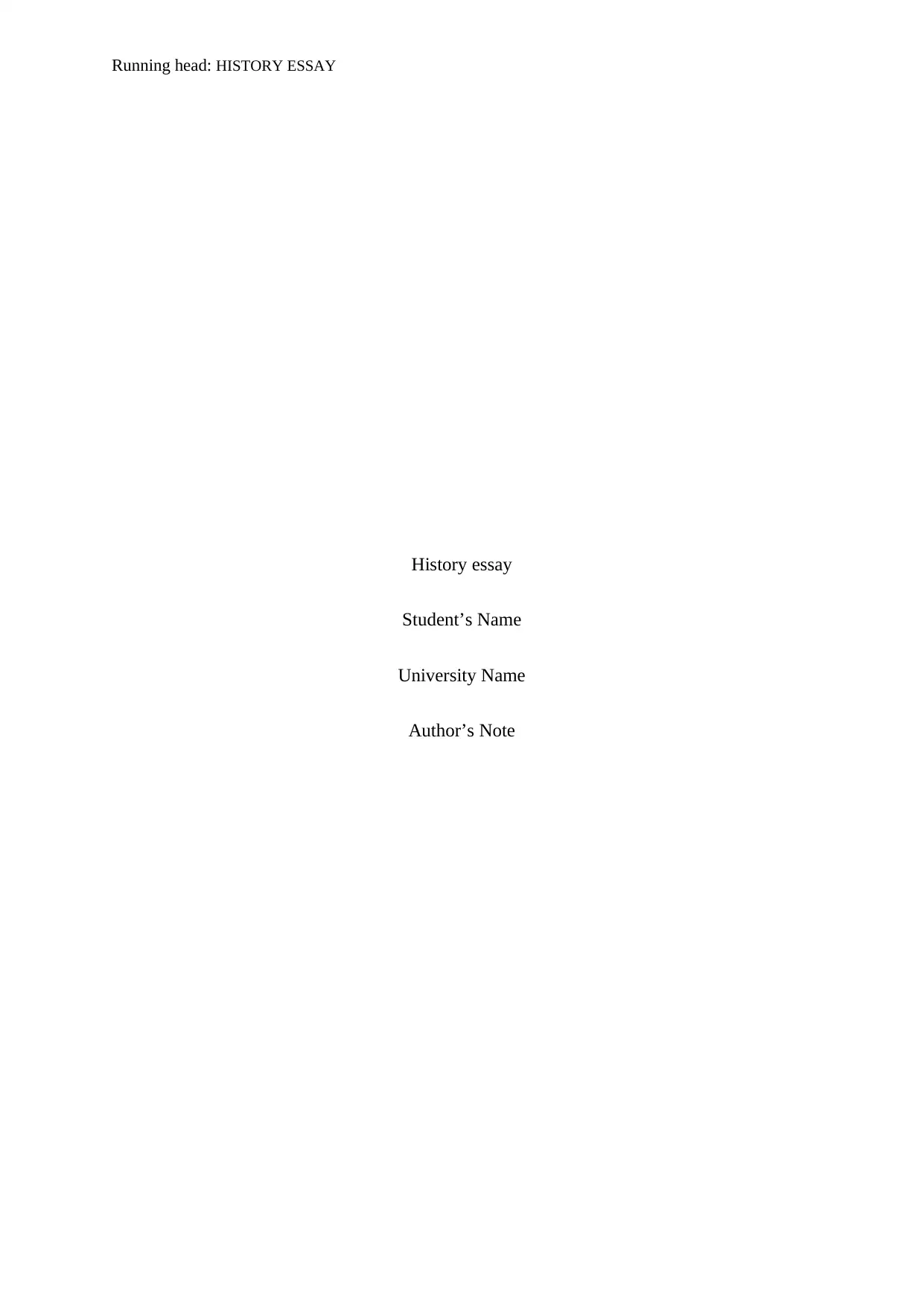
Running head: HISTORY ESSAY
History essay
Student’s Name
University Name
Author’s Note
History essay
Student’s Name
University Name
Author’s Note
Paraphrase This Document
Need a fresh take? Get an instant paraphrase of this document with our AI Paraphraser
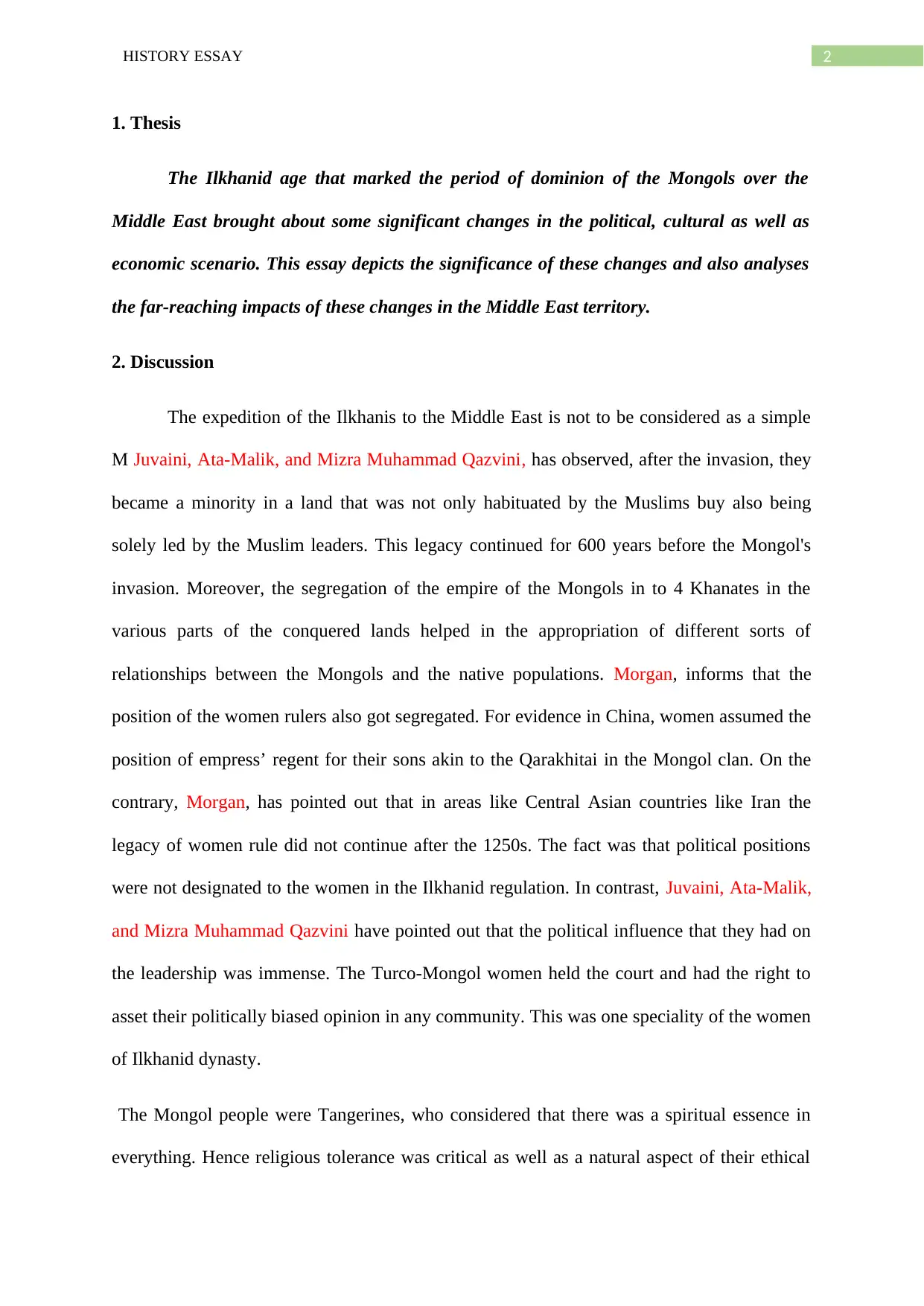
2HISTORY ESSAY
1. Thesis
The Ilkhanid age that marked the period of dominion of the Mongols over the
Middle East brought about some significant changes in the political, cultural as well as
economic scenario. This essay depicts the significance of these changes and also analyses
the far-reaching impacts of these changes in the Middle East territory.
2. Discussion
The expedition of the Ilkhanis to the Middle East is not to be considered as a simple
M Juvaini, Ata-Malik, and Mizra Muhammad Qazvini, has observed, after the invasion, they
became a minority in a land that was not only habituated by the Muslims buy also being
solely led by the Muslim leaders. This legacy continued for 600 years before the Mongol's
invasion. Moreover, the segregation of the empire of the Mongols in to 4 Khanates in the
various parts of the conquered lands helped in the appropriation of different sorts of
relationships between the Mongols and the native populations. Morgan, informs that the
position of the women rulers also got segregated. For evidence in China, women assumed the
position of empress’ regent for their sons akin to the Qarakhitai in the Mongol clan. On the
contrary, Morgan, has pointed out that in areas like Central Asian countries like Iran the
legacy of women rule did not continue after the 1250s. The fact was that political positions
were not designated to the women in the Ilkhanid regulation. In contrast, Juvaini, Ata-Malik,
and Mizra Muhammad Qazvini have pointed out that the political influence that they had on
the leadership was immense. The Turco-Mongol women held the court and had the right to
asset their politically biased opinion in any community. This was one speciality of the women
of Ilkhanid dynasty.
The Mongol people were Tangerines, who considered that there was a spiritual essence in
everything. Hence religious tolerance was critical as well as a natural aspect of their ethical
1. Thesis
The Ilkhanid age that marked the period of dominion of the Mongols over the
Middle East brought about some significant changes in the political, cultural as well as
economic scenario. This essay depicts the significance of these changes and also analyses
the far-reaching impacts of these changes in the Middle East territory.
2. Discussion
The expedition of the Ilkhanis to the Middle East is not to be considered as a simple
M Juvaini, Ata-Malik, and Mizra Muhammad Qazvini, has observed, after the invasion, they
became a minority in a land that was not only habituated by the Muslims buy also being
solely led by the Muslim leaders. This legacy continued for 600 years before the Mongol's
invasion. Moreover, the segregation of the empire of the Mongols in to 4 Khanates in the
various parts of the conquered lands helped in the appropriation of different sorts of
relationships between the Mongols and the native populations. Morgan, informs that the
position of the women rulers also got segregated. For evidence in China, women assumed the
position of empress’ regent for their sons akin to the Qarakhitai in the Mongol clan. On the
contrary, Morgan, has pointed out that in areas like Central Asian countries like Iran the
legacy of women rule did not continue after the 1250s. The fact was that political positions
were not designated to the women in the Ilkhanid regulation. In contrast, Juvaini, Ata-Malik,
and Mizra Muhammad Qazvini have pointed out that the political influence that they had on
the leadership was immense. The Turco-Mongol women held the court and had the right to
asset their politically biased opinion in any community. This was one speciality of the women
of Ilkhanid dynasty.
The Mongol people were Tangerines, who considered that there was a spiritual essence in
everything. Hence religious tolerance was critical as well as a natural aspect of their ethical
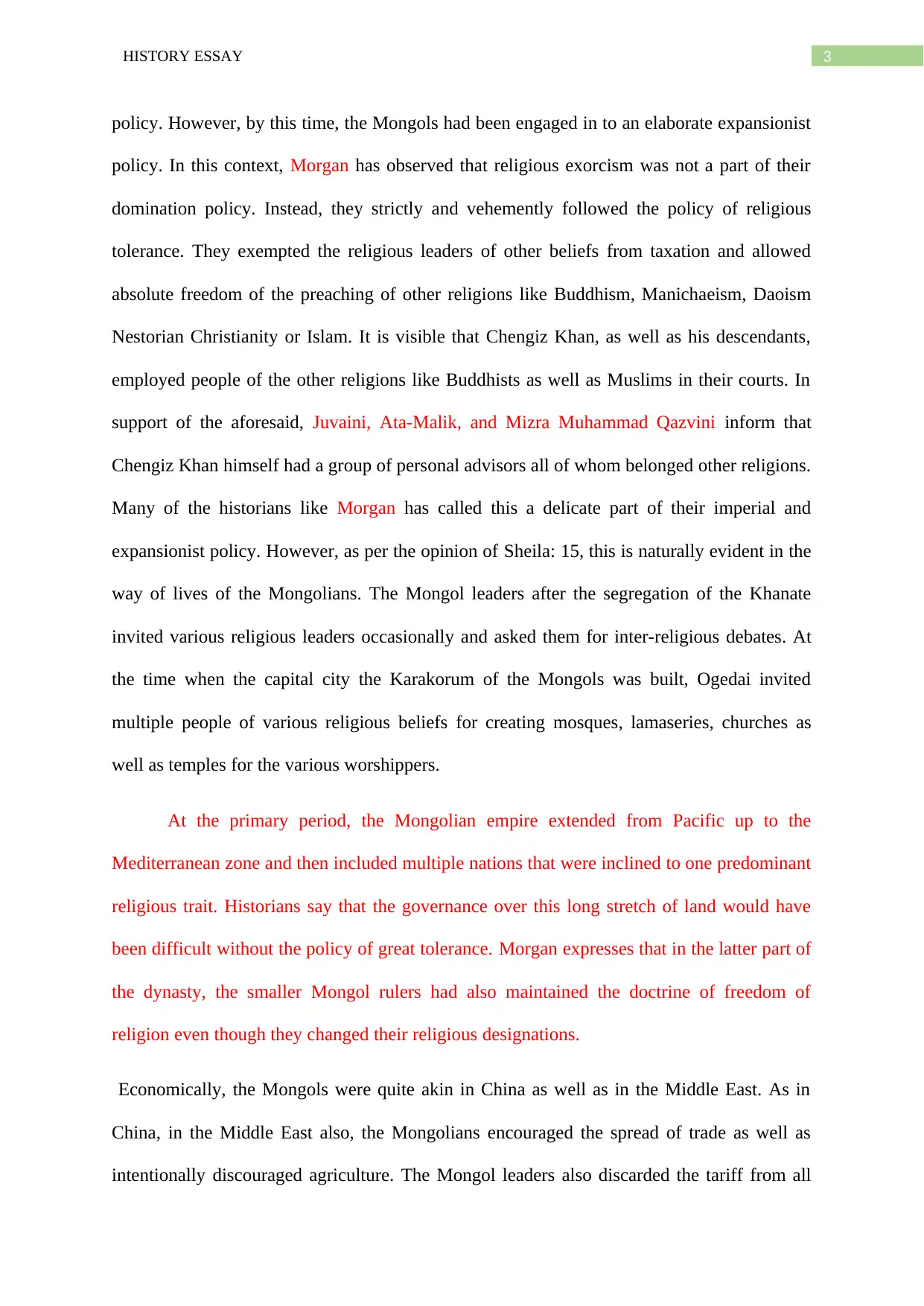
3HISTORY ESSAY
policy. However, by this time, the Mongols had been engaged in to an elaborate expansionist
policy. In this context, Morgan has observed that religious exorcism was not a part of their
domination policy. Instead, they strictly and vehemently followed the policy of religious
tolerance. They exempted the religious leaders of other beliefs from taxation and allowed
absolute freedom of the preaching of other religions like Buddhism, Manichaeism, Daoism
Nestorian Christianity or Islam. It is visible that Chengiz Khan, as well as his descendants,
employed people of the other religions like Buddhists as well as Muslims in their courts. In
support of the aforesaid, Juvaini, Ata-Malik, and Mizra Muhammad Qazvini inform that
Chengiz Khan himself had a group of personal advisors all of whom belonged other religions.
Many of the historians like Morgan has called this a delicate part of their imperial and
expansionist policy. However, as per the opinion of Sheila: 15, this is naturally evident in the
way of lives of the Mongolians. The Mongol leaders after the segregation of the Khanate
invited various religious leaders occasionally and asked them for inter-religious debates. At
the time when the capital city the Karakorum of the Mongols was built, Ogedai invited
multiple people of various religious beliefs for creating mosques, lamaseries, churches as
well as temples for the various worshippers.
At the primary period, the Mongolian empire extended from Pacific up to the
Mediterranean zone and then included multiple nations that were inclined to one predominant
religious trait. Historians say that the governance over this long stretch of land would have
been difficult without the policy of great tolerance. Morgan expresses that in the latter part of
the dynasty, the smaller Mongol rulers had also maintained the doctrine of freedom of
religion even though they changed their religious designations.
Economically, the Mongols were quite akin in China as well as in the Middle East. As in
China, in the Middle East also, the Mongolians encouraged the spread of trade as well as
intentionally discouraged agriculture. The Mongol leaders also discarded the tariff from all
policy. However, by this time, the Mongols had been engaged in to an elaborate expansionist
policy. In this context, Morgan has observed that religious exorcism was not a part of their
domination policy. Instead, they strictly and vehemently followed the policy of religious
tolerance. They exempted the religious leaders of other beliefs from taxation and allowed
absolute freedom of the preaching of other religions like Buddhism, Manichaeism, Daoism
Nestorian Christianity or Islam. It is visible that Chengiz Khan, as well as his descendants,
employed people of the other religions like Buddhists as well as Muslims in their courts. In
support of the aforesaid, Juvaini, Ata-Malik, and Mizra Muhammad Qazvini inform that
Chengiz Khan himself had a group of personal advisors all of whom belonged other religions.
Many of the historians like Morgan has called this a delicate part of their imperial and
expansionist policy. However, as per the opinion of Sheila: 15, this is naturally evident in the
way of lives of the Mongolians. The Mongol leaders after the segregation of the Khanate
invited various religious leaders occasionally and asked them for inter-religious debates. At
the time when the capital city the Karakorum of the Mongols was built, Ogedai invited
multiple people of various religious beliefs for creating mosques, lamaseries, churches as
well as temples for the various worshippers.
At the primary period, the Mongolian empire extended from Pacific up to the
Mediterranean zone and then included multiple nations that were inclined to one predominant
religious trait. Historians say that the governance over this long stretch of land would have
been difficult without the policy of great tolerance. Morgan expresses that in the latter part of
the dynasty, the smaller Mongol rulers had also maintained the doctrine of freedom of
religion even though they changed their religious designations.
Economically, the Mongols were quite akin in China as well as in the Middle East. As in
China, in the Middle East also, the Mongolians encouraged the spread of trade as well as
intentionally discouraged agriculture. The Mongol leaders also discarded the tariff from all
⊘ This is a preview!⊘
Do you want full access?
Subscribe today to unlock all pages.

Trusted by 1+ million students worldwide
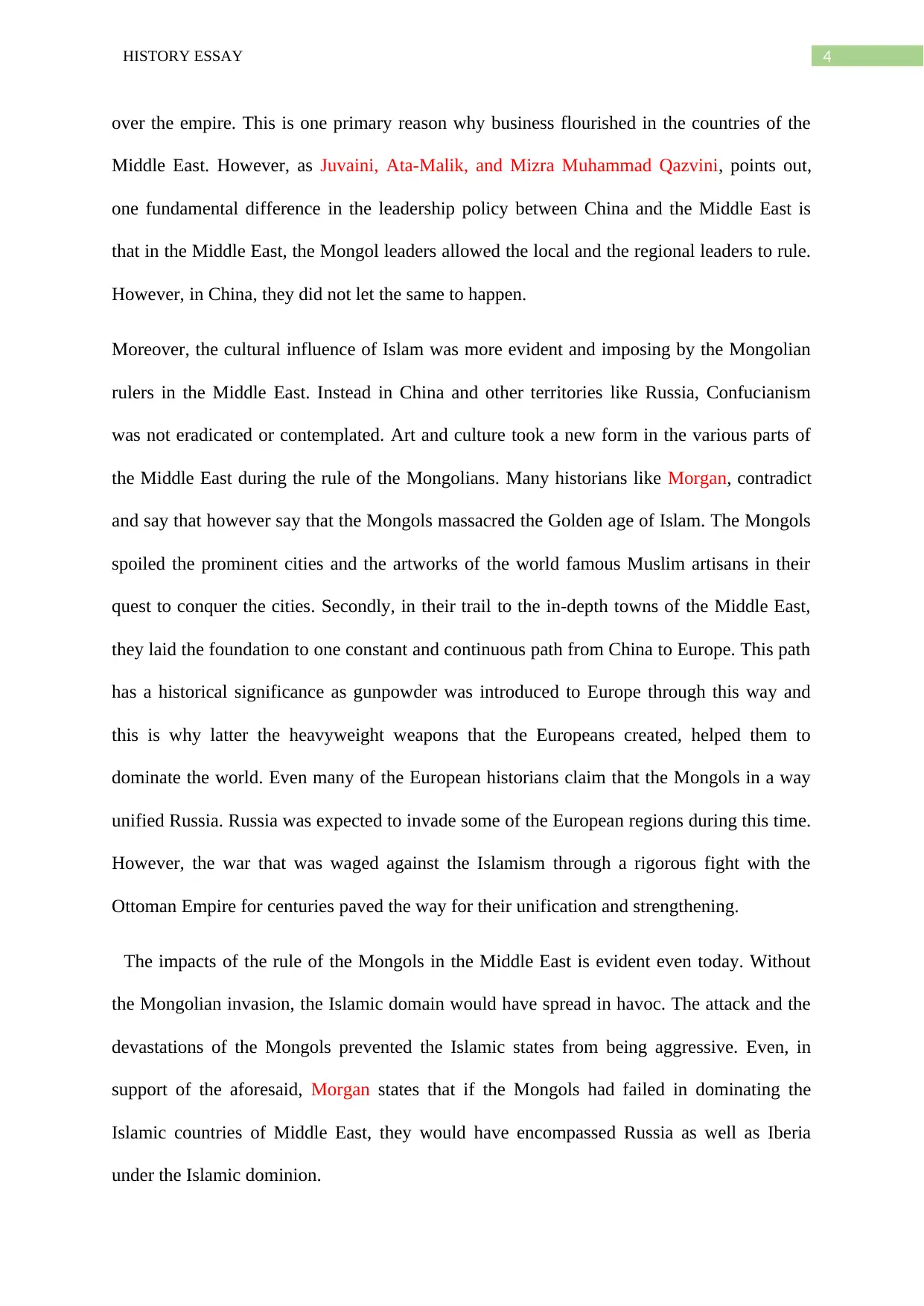
4HISTORY ESSAY
over the empire. This is one primary reason why business flourished in the countries of the
Middle East. However, as Juvaini, Ata-Malik, and Mizra Muhammad Qazvini, points out,
one fundamental difference in the leadership policy between China and the Middle East is
that in the Middle East, the Mongol leaders allowed the local and the regional leaders to rule.
However, in China, they did not let the same to happen.
Moreover, the cultural influence of Islam was more evident and imposing by the Mongolian
rulers in the Middle East. Instead in China and other territories like Russia, Confucianism
was not eradicated or contemplated. Art and culture took a new form in the various parts of
the Middle East during the rule of the Mongolians. Many historians like Morgan, contradict
and say that however say that the Mongols massacred the Golden age of Islam. The Mongols
spoiled the prominent cities and the artworks of the world famous Muslim artisans in their
quest to conquer the cities. Secondly, in their trail to the in-depth towns of the Middle East,
they laid the foundation to one constant and continuous path from China to Europe. This path
has a historical significance as gunpowder was introduced to Europe through this way and
this is why latter the heavyweight weapons that the Europeans created, helped them to
dominate the world. Even many of the European historians claim that the Mongols in a way
unified Russia. Russia was expected to invade some of the European regions during this time.
However, the war that was waged against the Islamism through a rigorous fight with the
Ottoman Empire for centuries paved the way for their unification and strengthening.
The impacts of the rule of the Mongols in the Middle East is evident even today. Without
the Mongolian invasion, the Islamic domain would have spread in havoc. The attack and the
devastations of the Mongols prevented the Islamic states from being aggressive. Even, in
support of the aforesaid, Morgan states that if the Mongols had failed in dominating the
Islamic countries of Middle East, they would have encompassed Russia as well as Iberia
under the Islamic dominion.
over the empire. This is one primary reason why business flourished in the countries of the
Middle East. However, as Juvaini, Ata-Malik, and Mizra Muhammad Qazvini, points out,
one fundamental difference in the leadership policy between China and the Middle East is
that in the Middle East, the Mongol leaders allowed the local and the regional leaders to rule.
However, in China, they did not let the same to happen.
Moreover, the cultural influence of Islam was more evident and imposing by the Mongolian
rulers in the Middle East. Instead in China and other territories like Russia, Confucianism
was not eradicated or contemplated. Art and culture took a new form in the various parts of
the Middle East during the rule of the Mongolians. Many historians like Morgan, contradict
and say that however say that the Mongols massacred the Golden age of Islam. The Mongols
spoiled the prominent cities and the artworks of the world famous Muslim artisans in their
quest to conquer the cities. Secondly, in their trail to the in-depth towns of the Middle East,
they laid the foundation to one constant and continuous path from China to Europe. This path
has a historical significance as gunpowder was introduced to Europe through this way and
this is why latter the heavyweight weapons that the Europeans created, helped them to
dominate the world. Even many of the European historians claim that the Mongols in a way
unified Russia. Russia was expected to invade some of the European regions during this time.
However, the war that was waged against the Islamism through a rigorous fight with the
Ottoman Empire for centuries paved the way for their unification and strengthening.
The impacts of the rule of the Mongols in the Middle East is evident even today. Without
the Mongolian invasion, the Islamic domain would have spread in havoc. The attack and the
devastations of the Mongols prevented the Islamic states from being aggressive. Even, in
support of the aforesaid, Morgan states that if the Mongols had failed in dominating the
Islamic countries of Middle East, they would have encompassed Russia as well as Iberia
under the Islamic dominion.
Paraphrase This Document
Need a fresh take? Get an instant paraphrase of this document with our AI Paraphraser
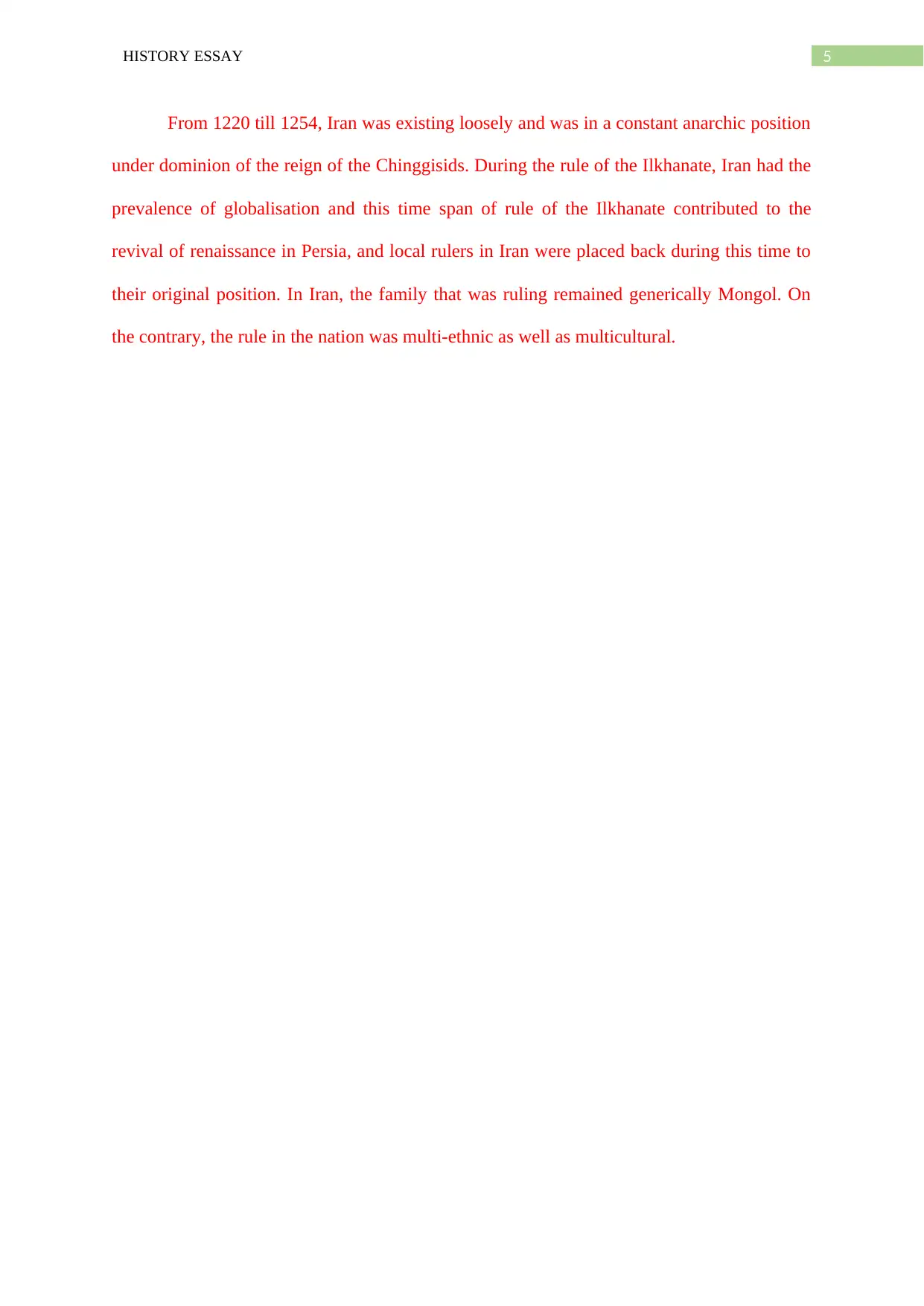
5HISTORY ESSAY
From 1220 till 1254, Iran was existing loosely and was in a constant anarchic position
under dominion of the reign of the Chinggisids. During the rule of the Ilkhanate, Iran had the
prevalence of globalisation and this time span of rule of the Ilkhanate contributed to the
revival of renaissance in Persia, and local rulers in Iran were placed back during this time to
their original position. In Iran, the family that was ruling remained generically Mongol. On
the contrary, the rule in the nation was multi-ethnic as well as multicultural.
From 1220 till 1254, Iran was existing loosely and was in a constant anarchic position
under dominion of the reign of the Chinggisids. During the rule of the Ilkhanate, Iran had the
prevalence of globalisation and this time span of rule of the Ilkhanate contributed to the
revival of renaissance in Persia, and local rulers in Iran were placed back during this time to
their original position. In Iran, the family that was ruling remained generically Mongol. On
the contrary, the rule in the nation was multi-ethnic as well as multicultural.
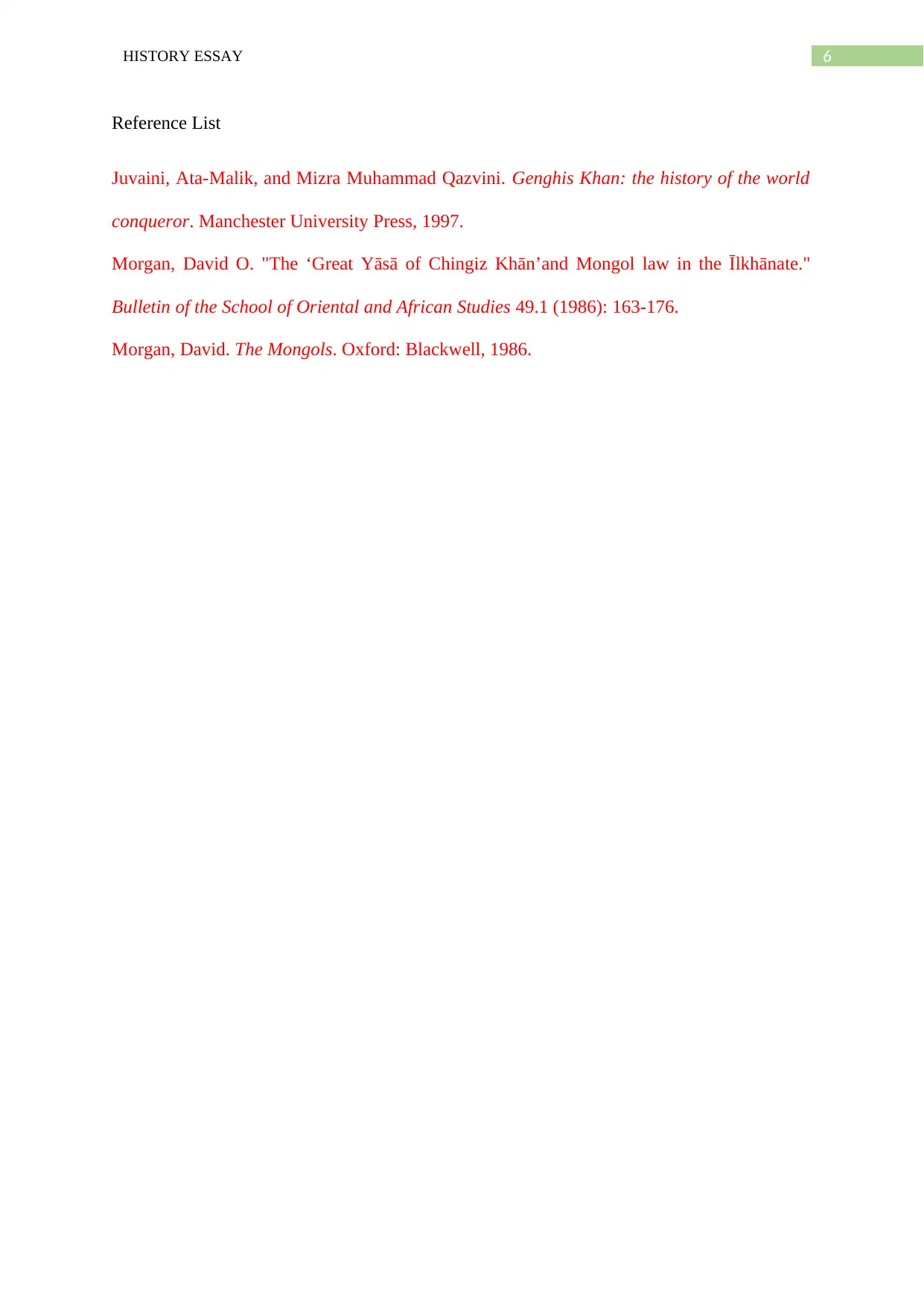
6HISTORY ESSAY
Reference List
Juvaini, Ata-Malik, and Mizra Muhammad Qazvini. Genghis Khan: the history of the world
conqueror. Manchester University Press, 1997.
Morgan, David O. "The ‘Great Yāsā of Chingiz Khān’and Mongol law in the Īlkhānate."
Bulletin of the School of Oriental and African Studies 49.1 (1986): 163-176.
Morgan, David. The Mongols. Oxford: Blackwell, 1986.
Reference List
Juvaini, Ata-Malik, and Mizra Muhammad Qazvini. Genghis Khan: the history of the world
conqueror. Manchester University Press, 1997.
Morgan, David O. "The ‘Great Yāsā of Chingiz Khān’and Mongol law in the Īlkhānate."
Bulletin of the School of Oriental and African Studies 49.1 (1986): 163-176.
Morgan, David. The Mongols. Oxford: Blackwell, 1986.
⊘ This is a preview!⊘
Do you want full access?
Subscribe today to unlock all pages.

Trusted by 1+ million students worldwide
1 out of 6
Your All-in-One AI-Powered Toolkit for Academic Success.
+13062052269
info@desklib.com
Available 24*7 on WhatsApp / Email
![[object Object]](/_next/static/media/star-bottom.7253800d.svg)
Unlock your academic potential
Copyright © 2020–2026 A2Z Services. All Rights Reserved. Developed and managed by ZUCOL.